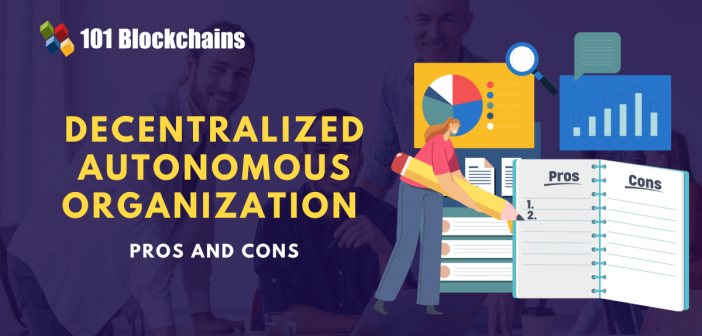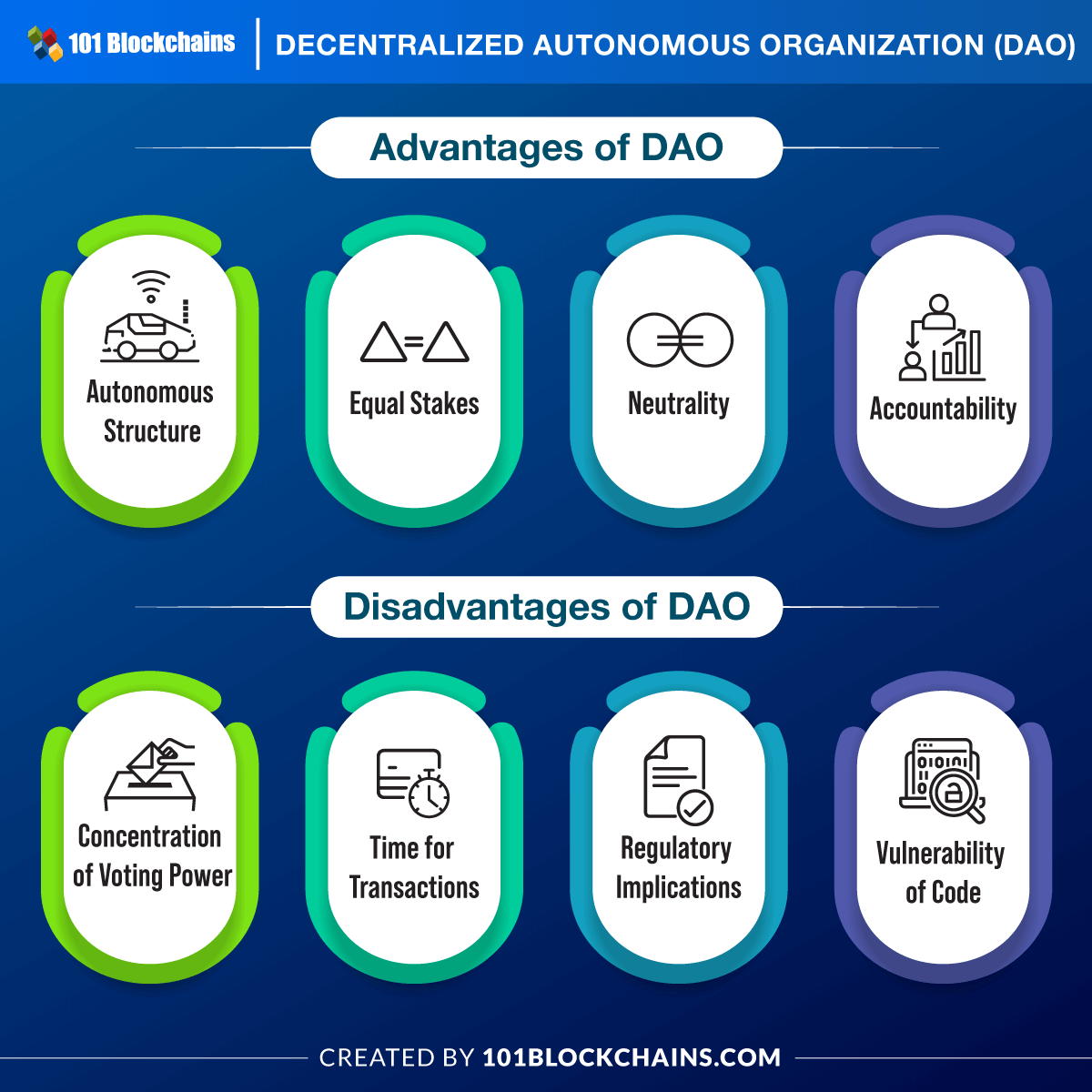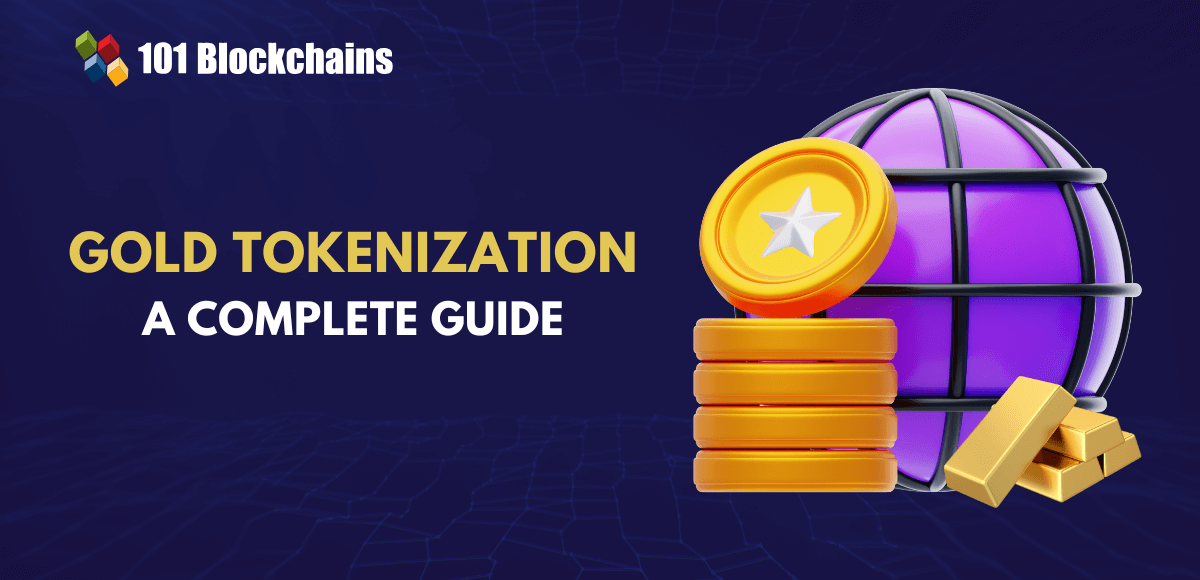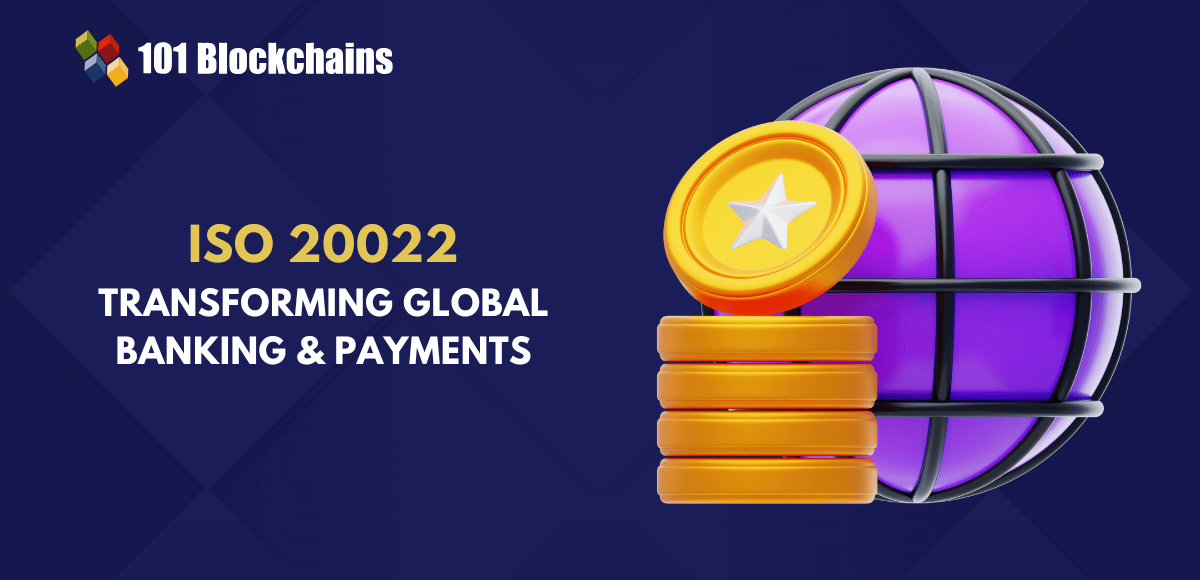Learn how blockchain truly works, master key definitions, and uncover what makes smart contracts so "smart." Dive into the fundamentals, gain valuable insights, and start your blockchain journey today!

- Guides
Georgia Weston
- on May 06, 2022
The Pros and Cons of a DAO
Have you learned the basics of DAOs? It’s a new method of creating autonomous, self-managed organizations with a decentralized structure. Dive deep to learn more about Decentralized Autonomous Organizations with the pros and cons of DAO.
The momentum of change in technology has been shifting gears, largely driven by blockchain technology. Blockchain introduced the benefits of decentralized autonomous organizations (DAOs) in recent times. Many of you might have obtained a basic overview of decentralized autonomous organizations or DAOs.
As a matter of fact, their name gives away everything. So, what are the pros and cons of DAO you need to know? After all, DAOs are a completely new term, and you need to understand them from a balanced perspective before making any decision. The following discussion offers you an overview of the benefits and setbacks for DAOs.
Excited to develop fluent knowledge of the DAO ecosystem? Enroll Now in DAO Fundamentals Course!
Definition of DAOs
The obvious highlight in a discussion on the advantages and disadvantages of DAO would start with the definition of a DAO. Decentralized Autonomous Organizations or DAOs are a new method of creating autonomous, self-managed organizations with a decentralized structure. The operations of the organization depend on a specific set of rules encoded in a smart contract.

As a result, DAOs remove the need for traditional hierarchies and intermediaries in an organization’s management. DAOs depend on collective organizational decision-making through decentralized governance. Therefore, you can notice some of the advantages of DAO in the definition itself. However, it is also important to wonder about the critical implications of DAOs before drawing out a viable conclusion regarding the same. You can learn more about the basics of DAOs in detail right now with examples and their applications.
Build your identity as a certified blockchain expert with 101 Blockchains’ Blockchain Certifications designed to provide enhanced career prospects.
Benefits of Decentralized Autonomous Organizations
The introduction of decentralized autonomous organizations has been one of the prominent highlights in the crypto space recently. DAOs are being considered the next big step in the evolution of the web3 ecosystem. From the looks of it, DAOs offer the foundational requirements for web3 organizations, such as transparency, decentralization, accessibility, and security. The discussion on decentralized autonomous organization advantages and setbacks is essential for anyone interested in figuring out the practical implications of adopting DAOs. Here is an outline of some of the top entries among the benefits of decentralized autonomous organizations.
-
Autonomous Structure
The best thing about finding the advantages of DAO is that their definition gives most of it away. For example, the autonomous structure of DAOs is the biggest source of advantages. Modern organizations and corporations encounter massive issues in management due to the top-down structure. With the help of an autonomous structure, DAOs ensure that every member of the organization is independent. As a result, it can facilitate the benefits of freedom from centralized intervention.
-
Equal Stakes
The next important pointer in discussions on decentralized autonomous organization advantages would focus on opportunities for everyone to contribute to the project. All investors in decentralized autonomous organizations have the opportunity to shape the decisions on running the future of the organizations. The number of DAO tokens of an investor would determine their voting power in the organization.
Any stakeholder can submit ideas and proposals for improvements or protocol changes. Most important of all, everyone in the DAO can see the new proposals and ideas, unlike conventional corporate boardrooms. On top of it, every member of the DAO can express their opinion on the new proposals and ideas through decentralized governance.
-
Neutrality
Most of the troubles and conflicts in modern organizations emerge from regular discrepancies against an established set of rules. The overview of the pros and cons of DAO would obviously focus on the neutral environment it creates for an organization. Without any intermediaries or managers holding significant authority in DAOs, you don’t have to deal with power plays and conflicts. From a technical perspective, a decentralized autonomous organization is all about the smart contract. Now, what do smart contracts have? They are nothing but a set of predefined rules and policies written into code.
After deploying the smart contract, the DAO takes care of implementing the rules without any or little intervention. Therefore, the assurance of predefined actions happening at the right time is a promising value advantage for an organization’s workflow.
-
Accountability
The most crucial highlight in the outline of decentralized autonomous organization advantages would obviously refer to accountability. One of the most prominent traits of DAOs is transparency, which calls for accountability of every member of the organization. For example, members must be careful about the design of the new proposals and ideas submitted to the DAO as they come with a cost. Why? Every member of the DAO would have to contribute a certain bit of their resources in evaluating the new proposal. Therefore, members should refine the implausible ideas and proposals to set the right direction for the organization’s future.
The significant highlights of accountability in the advantages of DAO would also point to the use of blockchain technology. Every activity of the organization is documented on the blockchain for eternity, thereby allowing flexibility for tracing back transactions to their origins. Many investors have shown interest in the DAO market, which is clearly evident in the growing popularity of DAO tokens. Transparency offers a credible advantage for reducing the possibilities of new scams in the crypto space, such as rug pulls.
Setbacks of Decentralized Autonomous Organizations
The detailed outline of the advantages and disadvantages of DAO is not complete without a look at the disadvantages. No matter how revolutionary DAOs may look, they have certain limitations. If you are looking for new prospects to adopt decentralized autonomous organizations, then you must also notice their pitfalls. The following list of disadvantages of DAO can help you learn more about the critical implications of DAOs.
-
Concentration of Voting Power
Decentralized governance in DAOs relies prominently on the possession of DAO tokens. While DAOs are intended to offer seamless accessibility, a specific group of investors can accumulate major shares of DAO tokens. As a result, they would gain higher voting power on the basis of the number of governance tokens they have.
What if the people with the highest share of governance tokens vote for unreasonable proposals? Does the structure of DAOs eliminate the problem of hierarchy completely? Therefore, the decentralized autonomous organization disadvantages start with the problems due to hierarchy in the DAO’s structure.
-
Time for Transactions
The community-based model of DAOs is one of the prominent highlights in discussions surrounding the pros and cons of DAOs. As of now, you must have thought that the community-based model is a positive highlight for DAOs. However, it can turn out to be a massive setback for an organization in case of contingency scenarios. For example, you cannot implement any changes in the DAO without voting mechanisms.
In addition, the voting mechanisms require time, and you might have to wait for quite a sizeable amount of time for every transaction on the DAO. Imagine if the DAO required an immediate modification in the smart contract code to resolve a security vulnerability. Without the consensus of all members of the DAO, it is impossible to employ any changes in the code. As a result, the organization can lose valuable time in resolving the concerns of a security breach.
-
Regulatory Implications
The outline of various disadvantages of DAO would be incomplete without referring to the regulatory concerns. Decentralized Autonomous Organizations can turn out to be regulatory nightmares, especially due to the lack of any definite rules and regulations for taxation and management of DAOs. The common aspect in advantages and disadvantages of DAO points out the critical implications of decentralized governance.
A community-based model not only imposes the burden of an extended transaction time and voting process but also takes away a bit of accountability. How? Isn’t accountability an important advantage of decentralized autonomous organizations? Well, DAOs don’t have any single entity accountable for all decisions of the organization. Therefore, it is quite difficult to implement any rules and regulations for decentralized autonomous organizations.
-
Vulnerability of Code
Another significant entry among the list of decentralized autonomous organization disadvantages refers to the dependence on smart contract code. Most of the DAOs focus on the idea that the smart contract code would take care of everything. DAOs obviously offered trustless environments, albeit with dependence on the authenticity and validity of the smart contract code. Now, it is important to note that every code is vulnerable, and even DAOs can deploy code with certain vulnerabilities. Therefore, the code driving the DAO can turn out as a huge setback for its growth in the future.
Want to know the real-world examples of smart contracts and understand how you can use it for your business? Check the presentation Now on Examples Of Smart Contracts
Final Words
The final impression regarding the pros and cons of DAO suggests that you have to embrace the positive and negative aspects equally. As a matter of fact, most of the disadvantages of DAOs are associated with the advantages of DAO, such as decentralization and transparency. For example, the community-based model has been responsible for limitations on transaction speeds and the time required for passing urgent proposals.
In addition, DAOs also depend on code that does not offer the assurance of complete safety against security threats. On the other hand, DAOs are a massive force in the emerging web3 ecosystem. You can witness many improvements in the design of DAO over the long term in the future. Learn more about DAOs with detailed learning resources.
*Disclaimer: The article should not be taken as, and is not intended to provide any investment advice. Claims made in this article do not constitute investment advice and should not be taken as such. 101 Blockchains shall not be responsible for any loss sustained by any person who relies on this article. Do your own research!






